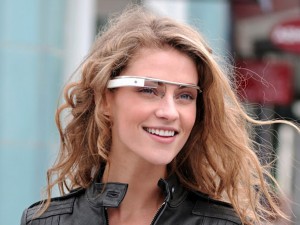Google Glasses Legal Issues
With the brave new frontier of Google Glasses just on the horizon, there are a lot of interesting legal issues that legislators and courts will need to address. Can the glasses be worn while driving? Will the glasses violate privacy rights? These and other pressing issues are addressed below.
 Accidents Caused by Distraction
Accidents Caused by Distraction
One basic issue that will come with the widespread use of Google Glasses is accidents caused by Glassing on the move. Whether one is stuck in traffic during rush hour or zipping through city streets on a bike – Google Glass will be there to distract.
Most current traffic laws permit hands-free mobile device use for conversation and navigation, but may prohibit front-seat entertainment video screens visible to the driver. Here, Google Glass will be hands free for navigation purposes, but who knows what drivers will actually be watching.
To resolve this issue, state legislators could take measures to strictly ban all Google Glass use while driving cars, bikes, and other vehicles. Alternatively, perhaps Google can add a “drive-mode” feature that restricts Google Glass use to only permissible features while the user is driving.
In the meantime, anyone who falls victim to a Google Glasser on the road may be able to look up the driver’s Glass-history to find out what exactly they were watching at the time of the accident. This can help prove negligence and enforce safe Glass driving practices before the rest of the laws catch up.
Intellectual Property Issues
The next set of Google Glass woes may come to movie theaters, concert halls, and any other entities trying to protect their intellectual property rights. Here, Google Glasses will make it ever-easier to snap a photo or video with the wink of an eye and record copyrighted material or document a company’s trade secrets.
However, smart-phones have already leaked miniature cameras into every forum imaginable, and in some ways Google Glasses may be less discrete than a sneaked smart-phone camera. Expect to see Google-Glass prohibitions in most entertainment forums. Companies trying to protect trade secrets can certainly maintain policies prohibiting cameras in areas with secret documents.
Discoverable Evidence
Sometimes at trial an attorney may say something like, “unfortunately, unlike CSI we can’t just go back in time and watch a video of what actually happened.” With Google Glass, that may no longer be the case.
With millions of little video cameras wandering around the streets on people’s faces, it will become all the more likely that torts and crimes will be documented.
These videos and pictures may come from the victim, the perpetrator, or a passerby. So, if you happen to witness an accident with your Google Glasses on, don’t be surprised if you receive a discovery request from an attorney requiring you to hand-over all of your Google Glass data related to the incident.
Reasonable Expectation of Privacy
On the one hand, the increased documentation of events will help courts solve crimes and reach just outcomes. However, what affect will this have on our privacy rights?
The Fourth Amendment protects all persons from unreasonable searches and seizures by the government. A search is considered unreasonable if it violates a person’s reasonable expectation of privacy. For example, a Federal Judge recently ruled that the NSA violated reasonable expectations of privacy by intercepting private phone records.
However, what happens to one’s reasonable expectation of privacy if we can reasonably expect everything we do to be documented by Google Glass. As our privacy expectations decrease, will police ability to reasonably document citizen activity increase?
Further, with face recognition technologies, will police be able to scan the streets with Google Glasses and pick up anyone with outstanding warrants or unpaid parking tickets?
Time will tell how legislators and courts respond to the tough legal questions raised by these brave new technologies. However, undoubtedly, any solutions reached will only be muddled by whatever must-have cyborg technology Google has in store for us next.


Comments